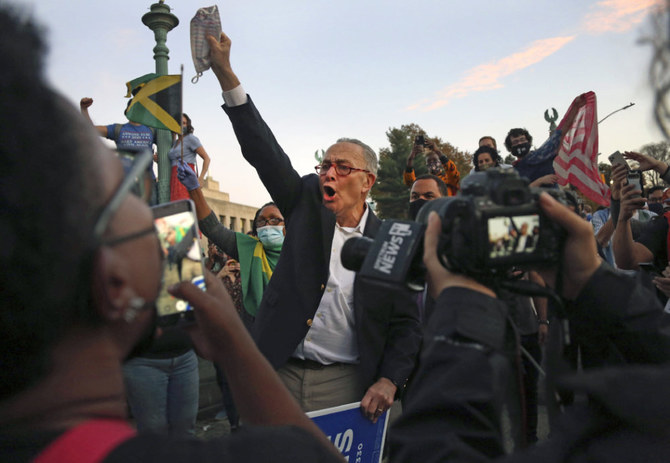NEW YORK: The TV networks had only just called Pennsylvania for Joe Biden, vaulting him over the 270 electoral votes needed to declare him a winner, when car horns started to blast all across the Sunnyside neighborhood of New York’s Queens borough.
Out of nowhere, drums began to beat amid the deafening, joyful screams.
“He lost his job! He lost his job!” cried out 23 year old Lynn Nguyen who was the first to descend to the street.
With tears flowing down her face, she said: “I can’t believe it. I’m so happy. I’m so relieved.”
“Relieved” was the word on many people’s lips as thousands gathered on the streets of America’s major cities to celebrate Biden’s victory over President Donald Trump.
Whether they congregated outside the White House in Washington, or at Union Square in downtown Manhattan, crowds cheered Trump’s loss and waved signs that read, “You’re fired” and “Trump is over.”
Suddenly, they would burst into a collective expletive against the man in the White House, the first incumbent to be defeated in nearly 30 years.
Amid the celebration noise, it was easy to forget for a moment the other half of the country who still think this is not over.
Trump has not conceded yet and there are no signs that he will do so anytime soon. The message from behind the White House shuttered doors remained consistent: Legal procedures are ongoing.
This, however was a moment for Biden’s supporters.
The trains to Manhattan were overcrowded, a rare sight in these pandemic times. Riders exited in droves at 5th Avenue Station and headed directly to the iconic Trump Tower, where heavy security awaited them. Streets and avenues were cordoned off all around the building. This is where it all started.
You could find every musical instrument amid the crowd and they were all playing to the same tune: “No more years! No more years.”
Sadie Stillwachs, 57, had planted herself on the corner since the small hours of Saturday morning.
“I had an unmistakable hunch that they were going to call it today,” she said. “This is a clear message to the world that Americans refuse to accept a fascist America.”
Jordana Wu, 30, a New York City resident held up a sign that said “Trump, Pence: Out.”
“This (Trump) tower has become a symbol of white nationalism, theocracy and fascism: These will never be legitimate in America,” she said.
The intensity picked up steam as crowds converged onto Times Square. Young men and women got the party started with Miley Cyrus’s “Party in the USA.”
They gathered under giant TV screens with chyrons looping the news of Biden’s victory.
Then a song for George Floyd played out. There was an abundance of images of the slain African American man whose death at the hands of a policeman was recorded on video and ignited a new movement for racial justice.
“This would not have happened without him paying the price with his life,” said a tearful young lady holding up a picture of Floyd. “Trump turned a blind eye, a deaf ear , to our struggle, and Floyd would have been so happy to see him go.”
Floyd’s brother had been rallying voters down in Brooklyn on Election Day.
Democrat Senator Chuck Schumer joined the crowd, hauling himself onto a makeshift podium. Even though his mask and the absence of a microphone made it hard to hear what he was saying, his inaudible slogans were synchronized with loud cheers.
True, everyone was wearing a mask. Still, in a matter of 10 minutes, the crowd swelled to thousands, pushing against each other. One cannot help but think of what Dr. Anthony Fauci would have thought of this: a superspreader event for sure.
There seems to be complete oblivion to the reality of a second wave of the coronavirus pandemic hitting the whole of the United States. While an election like none before has played out all week, the US has been breaking its own COVID-19 record in the past few days, with nearly 120,000 daily cases.
Away from the crowd, Debbie Moody, a senior Manhattanite, sat at her usual bench in the small park in Chelsea near her apartment, and video called her sister in Florida who was lamenting the absence of celebrations in her heavily Republican county. She was nervous of imminent protests that could break out anytime.
Debbie tried comforting her with a loud laugh: “Don’t worry, Honey. Even Fox News called him a winner.”
As we were chatting, a man on a bike passed us, yelling “Lock him up” into a loudspeaker. His call was met with a collective applause that rose from the packed cafes and restaurants nearby, where alcohol flowed freely from waiters to patrons.
Debbie stood up and went back home to watch the Queen’s Gambit.
“Don’t forget. 8 O’Clock tonight, Biden is going to speak.”
























